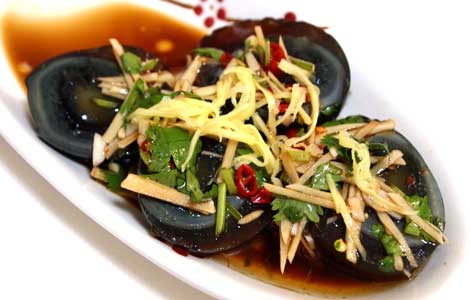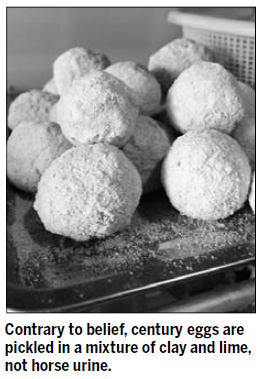Delicacies
Egging the issue
Updated: 2011-07-10 07:48
By Mike Peters and Liu Yujie (China Daily)

|
 Century eggs are served with pickled ginger, chopped coriander, a little chili and a dressing of vintage vinegar and sesame oil. Photos by Pauline D Loh / China Daily |
Mike Peters says "What's the fuss?" about the century egg, while Liu Yujie unmasks the myths behind this much-maligned, much misunderstood Chinese delicacy.
It wasn't quite the assassination of the Archduke Ferdinand - the bang that started World War I - but a CNN web writer's potshot at century eggs last week had foodies firing back from every corner of the Chinese cultural world.
After his CNN iReport listed the "best submissions" about "revolting" foods, Danny Holwerda said the comments section was full of angry people calling Americans "fat xenophobes with terrible dietary habits". Holwerda tried to tamp down "the first international incident" he's been embroiled in, saying he would like to visit China with open arms and mind, but no one would get him to eat any more century eggs.
"It's awful - it tastes like the devil cooked eggs for me," Holwerda wrote in his original blog posting. "It tastes like something that used to be an egg, but made some really horrible choices."
Andrew Demaria, CNNGo's editor-in-chief, tried to eat some of those words on Thursday, posting a statement on the website saying, "We apologize unreservedly for any offense the article has inadvertently caused."
In face, Demaria said, he personally loves century egg and likes it most with some pickled ginger at his favorite Hong Kong restaurant.
The apology was accepted by a leading century-egg producer who had demanded it, but the internet buzz lives on.
Like Holwerda, I am from Texas - a culinary wonderland where folks stand over a sink with a moonpie in one hand and a can of Mountain Dew in the other and call it lunch. (That's a cheap shot, too - there's plenty of pretty darned good food in Texas.)
The CNN report was probably a tongue-in-cheek effort. Another blogger in the same report says with epicurean earnestness: "I'll tell you honestly that crickets taste better than spiders."
After inviting its correspondents abroad to describe their "most challenging" food experiences, the site compiled "in no particular order" a list that included Philippine woodworms, fermented soybean chips from Indonesia, dog meat from South Korea, fried tarantulas from Cambodia and stir-fried cicadas from Thailand.
"Century eggs are popular among the Chinese as a pungent appetizer," CNN said in the iReport. "But for others, the idea of feasting on black eggs that have been preserved in clay for months may not be appetizing."
Holwerda, it went on, "purchased the notorious foodstuff from an Asian supermarket in Texas in April this year and was not impressed with its taste."
Notorious foodstuff? Hmmmm.
Gastronomist from Taiwan Fei Chi told the Taiwan Times that although pidan (century eggs) had the form of an egg, physical and chemical changes during the process changed the taste.
Fei blamed the poor rating on Holwerda's inability to appreciate its taste. Taiwan food critic Tao Li-jun speculated that the Texan had eaten the egg without condiments, noting that "pidan with diced scallion, sesame oil or soy sauce made for a delicious dish and if it is eaten with chilled tofu in summer it is even tastier".
Fei told the newspaper he would click "Like" for pidan 100,000 times on Facebook.
While CNN's list of "gross" foods seems skewed against Asia, many people are simply fearful of the unfamiliar.
I know plenty of Americans who won't eat pate - so civilized! So French! - or anything with liver. Organ meat can inspire shudders, too, whether prepared in a Chinese or European kitchen.
Some other foods my expat colleagues find intimidating: the mere ideas of blood sausage and head cheese blood soup balut (a fertilized duck or chicken embryo, boiled and eaten in the shell)
"One-hundred-year eggs are OK," a British colleague confides. "Brussels sprouts and boiled cabbage are vile."
Getting the thumbs-down from an Aussie expat: "Haggis and anything other than fish and chips in England."
Ripe jackfruit and Bombay Duck (actually a fish similar to a sardine) get a sensory rejection for their smells.
All of them, like century eggs, are acquired tastes.
Squeamishness about alien foods doesn't mean you disrespect the culture that produces them.
"If you read some more of my blog," Holwerda says in a recent posting in response to his critics, "I think you'll find that I enjoyed several traditional Chinese foods very much. It is one of my fondest dreams to visit China someday!"
If he does, I want to be there for the food fight. In the meantime, I'm going to have another century egg - and a big platter of silky tofu with crab roe. But I'll just say no to escargot.
You can contact the writer at michael
peters@chinadaily.com.cn.

Specials

90th anniversary of the CPC
The Party has been leading the country and people to prosperity.

The write stuff
'Pen capital' goes back to drawing board for answers to economic changes taking shape in Zhejiang

Say hello to hi panda
An unusual panda is the rising star in Europe's fashion circles
